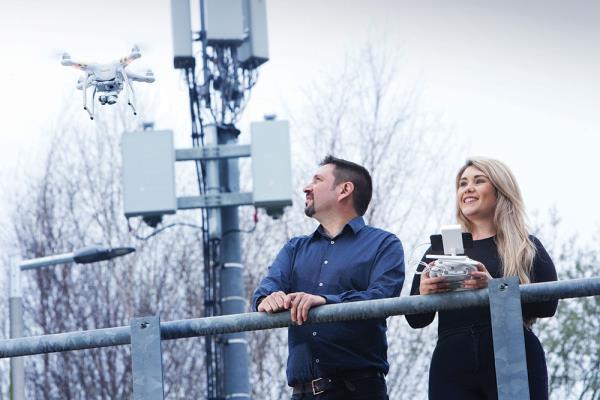07 May 2018

A week after winning the largest amount of 5G spectrum, Vodafone claimed a milestone in UK telecoms with the first test of 3.4GHz frequencies. Jade Knight, head of network deployment for the South, and Peter Rodriquez, head of 5G Delivery, are seen here using a drone to check on the status of the 5G mobile site in Newbury without having to turn the service off.
O2 emerged as the big winner in Ofcom’s spectrum sale for 4G and future 5G services.
Five companies were approved to take part in the auction to bid for two frequency bands: 2.3GHz and 3.4GHz.
2.3GHz can be used by current mobiles and will help improve 4G capacity. The reserve price for each 2.3GHz lot was £10m, and there were four lots of spectrum (each of 10MHz). 3.4GHz is one of the bands earmarked for 5G and will become usable in around a year or so. The reserve for each 3.4GHz lot was £1m and there were thirty lots, each of 5MHz.
The principal stage of the auction ended in early April and raised more than £1.35bn for the government, and increases the airwaves available for mobile devices by almost one third.
Telefónica, the Spanish operator which owns O2, gained all 40MHz of 2.3GHz spectrum available at a cost of £205,896,000, and 40MHz of 3.4GHz spectrum at a cost of £317,720,000.
Other operators who also won a share of 3.4GHz frequencies include EE which paid £302,592,000 for 40MHz; Hutchison 3G UK which paid £151,296,000 for 20MHz; and Vodafone Limited which won 50MHz for £378,240,000.
Airspan Spectrum Holdings – which is backed by Japanese mobile and tech firm SoftBank (which bought Arm in 2016) as well as other investors including US wireless infrastructure specialist Airspan – did not gain spectrum in either band.
Ofcom placed two caps on the spectrum any one operator can hold to protect competition in the market. The first meant that EE, which already holds the most spectrum, was not able to bid for any frequencies in the 2.3GHz band. The second is an overall cap on how much a single operator can hold after the auction.
According to Kester Mann, principle analyst, operators at CCS Insight, the overall spend was higher than expected and reflects a hugely competitive sale. While noting the positive wins for O2 and EE, he said the auction results will do little to improve Three’s “precarious” market position.
“Having campaigned tirelessly for more favourable conditions, it was surprising not to see it spend more. Three remains sub-scale and without fixed-line assets in a market gradually moving towards multiplay services, and [the] outcome will do little to dampen doubts over its long-term future.”
Vodafone secured the largest slice of 5G spectrum and spent the most for these frequencies. “This re-enforces its renewed long-term commitment to the UK following several years in the doldrums,” said Mann. “It still has plenty to do to turn its fortunes around, but today’s news will boost long-term efforts to regain lost momentum.
Within a week of securing its spectrum, Vodafone announced that it had become the UK’s first operator to test 5G frequencies across a live network. The firm used a site at its Manchester contact centre, which houses around 1,000 customer service employees, and its offices in Newbury in Berkshire.
During the test, Vodafone deployed Massive MIMO (also known as Active Antennae) technology combined with 3.4GHz spectrum running over its core 4G network.
This technology is a key building block for 5G as a system with multiple antennae able to send and receive data more efficiently, boosting capacity where lots of people are simultaneously connecting to the network.
Vodafone UK chief executive Nick Jeffery said the test was just the beginning: “We are now preparing our network for 5G while continuing to increase the capacity and extend the reach of our existing 4G network.”
Meanwhile, Mann said attention now moves to Ofcom’s sale of 700MHz spectrum that could be auctioned as soon as next year. These frequencies could also be used for 5G and mobile broadband as they offer wide-area coverage.










